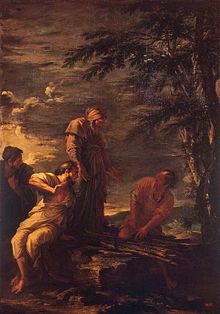Protagoras (dialogue)
Appearance

Protagoras (Πρωταγόρας) is a dialogue by Plato. The main argument is between Socrates and the elderly Protagoras, a celebrated sophist and philosopher. The discussion takes place at the home of Callias, who is host to Protagoras while he is in town, and concerns the nature of sophists, the unity and the teachability of virtue.
Quotes
[edit]- Do you realize the sort of danger to which you are going to expose your soul? If it were a case of putting your body into the hands of someone and risking the treatment’s turning out beneficial or the reverse, you would ponder deeply whether to entrust it to him or not, and would spend many days over the question, calling in the counsel of your friends and relations. But when it comes to something which you value more highly than your body, namely your soul—something on whose beneficial or harmful treatment your whole welfare depends—you have not consulted either your father or your brother or any of us who are your friends on the question of whether or not to entrust your soul to the stranger.
- 313a, W. K. C. Guthrie, trans. (Collected Dialogs, p. 312)
- Is not a Sophist, Hippocrates, one who deals wholesale or retail in the food of the soul? To me that appears to be his nature. … Knowledge is the food of the soul; and we must take care, my friend, that the Sophist does not deceive us when he praises what he sells, like the dealers wholesale or retail who sell the food of the body; for they praise indiscriminately all their goods, without knowing what are really beneficial or hurtful. Neither do their customers know … unless he who buys of them happens to be a physician of the soul.
- 313c, Benjamin Jowett, trans.
- The talk about the poets seems to me like a commonplace entertainment to which a vulgar company have recourse; who, because they are not able to converse or amuse one another, while they are drinking, with the sound of their own voices and conversation, by reason of their stupidity, raise the price of flute-girls in the market, hiring for a great sum the voice of a flute instead of their own breath, to be the medium of intercourse among them: but where the company are real gentlemen and men of education, you will see no flute-girls, nor dancing-girls, nor harp-girls; and they have no nonsense or games, but are contented with one another’s conversation, of which their own voices are the medium, and which they carry on by turns and in an orderly manner, even though they are very liberal in their potations. And a company like this of ours, and men such as we profess to be, do not require the help of another’s voice, or of the poets whom you cannot interrogate about the meaning of what they are saying; people who cite them declaring, some that the poet has one meaning, and others that he has another, and the point which is in dispute can never be decided. This sort of entertainment they decline, and prefer to talk with one another, and put one another to the proof in conversation. And these are the models which I desire that you and I should imitate. Leaving the poets, and keeping to ourselves, let us try the mettle of one another and make proof of the truth in conversation.
- 347c, Benjamin Jowett, trans.
- The wisdom which knows what are and are not dangers is opposed to the ignorance of them
- 360d, Benjamin Jowett, trans.
- Sometimes misattributed as "Courage is knowing what to fear and what not to fear", this paraphrase is actually from Werner Jaeger's book Paideia: the Ideal of Greek Culture, Volume II, p. 122, where the footnote references Protagoras 360d5.

